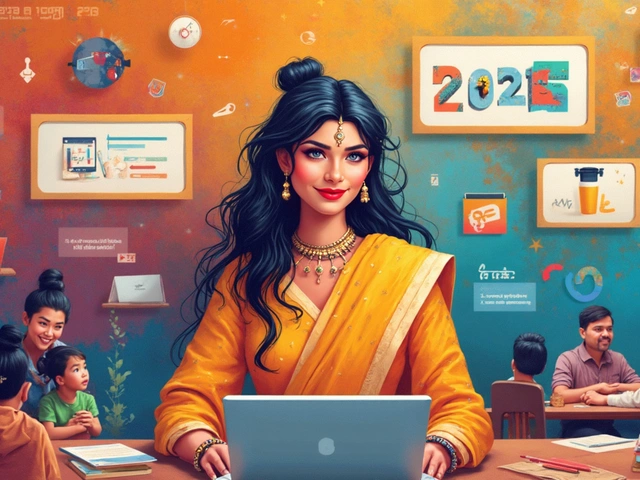Embarking on the journey to learn coding is like setting sail on the vast digital ocean. Each person’s voyage is unique, dictated by their prior knowledge, chosen path, and resilience through uncharted technical waters. It's a journey that promises to be both challenging and rewarding, with numerous factors influencing how long it might take to navigate from novice to proficient coder.
The time you’ll need to invest hinges significantly on your approach, the complexity of your chosen programming language, and the goals you aim to achieve. For some, it is a sprint; for others, a marathon. This article delves into the many facets of learning to code, shedding light on realistic timelines and offering valuable tips to make your coding quest not just a pursuit of knowledge, but a fulfilling adventure.
- Understanding the Basics
- Choosing the Right Language
- Setting Realistic Goals
- Effective Learning Strategies
- Common Challenges and How to Overcome Them
- Maintaining Motivation and Building Projects
Understanding the Basics
When starting the journey to learn to code, the first step is to grasp the fundamentals. Coding, at its core, is akin to learning a new language — albeit a digital one. The basics begin with understanding how computers interpret commands written in programming languages to perform specific tasks. It's about breaking down complex tasks into smaller, manageable parts, much like following a detailed recipe or assembling a piece of furniture. Knowing how programming languages like Python, JavaScript, or Ruby function is essential; each has unique syntax and principles but shares foundational logic with others.
One of the first concepts a budding coder must embrace is the idea of variables. Variables are the building blocks of programming, acting as containers that store data values. A deeper dive reveals how they can change and adapt throughout a program, an essential feature for developing dynamic applications. Alongside variables, understanding data types — such as strings, integers, booleans, and arrays — is a crucial step. These data types determine the kinds of operations that can be performed on the stored data, analogous to how different ingredients in cooking require specific methods of preparation. The early stages of coding involve learning to declare and manipulate these variables effectively.
Another critical aspect is mastering control structures like loops and conditional statements. These structures control the flow of execution, allowing a program to make decisions and repeat certain tasks. Imagine you're constructing a game like 'Rock, Paper, Scissors'; having control structures allows the program to evaluate choices and declare a winner. Additionally, functions and procedures are concepts that come into play, enabling coders to write reusable code blocks and streamline coding tasks. Such understanding not only optimizes code but reduces redundancy and potential errors, paving the way for efficient coding practices.
For anyone diving into coding, developing problem-solving skills is as important as typing out lines of code. Programming challenges demand a blend of creativity and logic, solving real-world issues through a coder’s lens. According to Steve Jobs, "Everybody in this country should learn to program a computer because it teaches you how to think." Using this philosophy, learning to code shapes a mindset that approaches problems systematically, breaking them into parts, analyzing each thoroughly, and crafting optimized solutions. Camaraderie with communities of coders, either in-person or online, also fosters a supportive environment, sharing knowledge and finding mentorship from more seasoned developers.
In the realm of coding, debugging is a skill as vital as coding itself. Errors or 'bugs' are part and parcel of every coder's journey. Debugging involves using tools and techniques to identify and fix these errors, ensuring that the final program runs seamlessly. Modern Integrated Development Environments (IDEs) offer built-in features to assist with debugging, streamlining the troubleshooting process and offering suggestions. Here, patience and perseverance become indispensable virtues, as the path to a working program often involves trial and error.
Delving into the world of coding requires a dedication to continuous learning because the field is ever-evolving with new technologies. For those just starting, elementary courses or tutorials — both free and paid — can provide a structured pathway into coding. From interactive websites to formal classroom settings, multiple avenues cater to different learning styles, making it accessible to anyone eager to learn. Thus, understanding the basics lays a strong foundation into a journey that holds boundless possibilities and an exciting invitation to innovate and create within the digital space.
Choosing the Right Language
When diving into the world of coding, one of the most pivotal decisions a budding coder faces is selecting the right programming language. This choice can significantly impact the learning journey, influencing the ease of understanding and the applicability of skills in real-world scenarios. The landscape of programming languages is vast, each with its unique strengths, purpose, and learning curves. For many beginners, the aim is to find a language that balances simplicity with potential for broad application—an entry point that opens doors to extensive future opportunities.
Python often emerges as a front-runner for beginners due to its simplicity and readability. Its syntax closely resembles everyday English, making it more intuitive for those who are new to coding. According to Stack Overflow's annual survey, Python consistently ranks among the most loved and used languages, and is particularly favored in data science, artificial intelligence, and web development. This widespread use not only reflects Python’s versatility but also means there’s a vast supportive community available to help learners overcome hurdles.
Another language frequently suggested for beginners is JavaScript. Known as the language of the web, JavaScript is essential for anyone interested in web development. It’s embedded in all modern web browsers, making it readily accessible for experimentation and learning. The language allows learners to see immediate results, fostering a sense of accomplishment which can be incredibly motivating. JavaScript's ecosystem, including frameworks like React and libraries such as jQuery, provides ample opportunities for learners to branch into more complex fields once they are comfortable with the basics.
Coding expert Alice Keeler once said, "Learning to code is like learning a new language you use to tell a computer what to do. The clearer and simpler you make it, the better the results."
For those with an interest in mobile app development, Swift and Kotlin are excellent options. Swift is Apple's language of choice for iOS apps, known for its performance and safety features. It’s designed to be friendly for new programmers while powerful enough for the most seasoned developers. Similarly, Kotlin has gained momentum as it is the preferred language for Android development, combining the best features of more traditional languages like Java while being easier to read and write.
A small but growing group of learners might consider starting with Ruby, which is known for its elegant and human-friendly syntax. Ruby on Rails, its popular framework, revolutionized web development through its Convention over Configuration philosophy, which allows coders to write less, but do more. This can be quite advantageous for those who wish to build web applications quickly and efficiently, understanding complex backend processes later on. In choosing a language, it's crucial to align it with personal goals and interests. Whether aiming for web, mobile, or software development, the perfect language is one that resonates with your aspirations and continuously drives your curiosity.

Setting Realistic Goals
When it comes to learning coding, one could easily feel overwhelmed watching experts effortlessly perform complex algorithms. The sensation of peering into a seemingly insurmountable mountain of code might make you second-guess your abilities. That's precisely why learning to set realistic goals is crucial. By breaking down this colossal task into manageable bits, you're effectively setting yourself up for small victories. For instance, instead of aiming to become a master coder within three months, it might be more practical to aim to become proficient in one specific programming skill during that period. This approach not only keeps you motivated, but it also maps out a more straightforward journey towards what you want to achieve.
While setting these goals, it’s essential to be specific about what you intend to accomplish with coding. Are you learning to code to change careers, or simply to expand your skill set? This distinction will help you tailor your approach and adjust your timeline. A wise tip is to break down your primary objective into smaller, more digestible goals. Think of it as a pathway rather than a single point in the distance. Having weekly or monthly milestones, such as understanding key concepts or completing small projects, can track your progress methodically. This method not only provides a framework for learning but also offers a psychological boost each time you tick a goal off your list.
“Setting clear, focused, and attainable goals will not only guide your learning path, but also foster long-term skill retention,” suggests a prominent educator at Codecademy.
“The journey of learning to code is not about reaching a final destination but enjoying each step you conquer.”By applying this attitude, learners often find themselves more enjoying the process rather than being fixated on outcomes.
Another vital aspect of goal-setting is to seek feedback whenever possible. You may rely on peer reviews, coding forums, or mentors to provide constructive criticism. This process is instrumental in highlighting areas that need improvement and reinforcing concepts you're already familiar with. An essential part of the coding journey is understanding and correcting mistakes, which, in hindsight, serve as invaluable learning experiences. Remember, even seasoned developers lean on the collective wisdom available in the coding community.
In today’s fast-paced world, remember not to rush the journey. Coding is as much an art as it is a science. Take time to experiment with different projects, learn new languages, and revisit areas of struggle. This fluid approach helps maintain a balance and prevents burnout. The ultimate aim is for learning to become a continuous process in your life rather than a box to be checked off. In turn, this flexibility nurtures an enthusiasm that can lead to innovative thinking and creative solutions in future challenges.
Effective Learning Strategies
Diving into the world of coding can seem daunting, but with the right strategies, you can transform the process into a structured and enjoyable journey. Patience and consistency are key as you navigate through new concepts and technologies. To begin, it's helpful to establish a clear schedule dedicated to your learning. Allocating specific time slots each day for coding can dramatically increase your productivity. Consistent short sessions are often more effective than sporadic long ones, as regular practice helps retain information better.
In the realm of coding, setting small, achievable milestones is invaluable. Each time you conquer a concept, it reinforces your confidence and fuels motivation to tackle the next challenge. Consider breaking down large projects into manageable tasks which can provide a clearer focus and make the learning process less overwhelming. This approach naturally complements the iterative nature of coding where small successes build on each other to form a comprehensive understanding of more complex issues.
The community-driven aspect cannot be overstated either. Joining forums or local coding clubs provides an essential support system of peers and mentors who have walked down the same path. Online platforms like Stack Overflow or GitHub are invaluable resources where you can ask questions and contribute to open-source projects, enhancing both your learning and network. As an old proverb states, "If you want to go far, go together." This holds remarkably true in coding communities.
"The best way to learn a language is to speak it. The same is true for programming: you write code." – Kent BeckStart coding hands-on as soon as possible. Whether you're following tutorials or working on your projects, implementing what you've learned solidifies concepts. Interactive platforms such as Codecademy or freeCodeCamp offer practice exercises that reinforce theoretical knowledge with real-world application. Getting your hands dirty with actual coding lines prepares you for future complexities and cements your understanding.
Finally, remain adaptable. The tech industry is dynamic, with trends and tools continually evolving. Acknowledge that what you start with might pave the way for learning other languages or frameworks. Staying updated with industry news, new libraries, and tools will ensure your skills remain relevant. Leverage learning platforms that update content regularly or pursue courses from institutions offering modernized curricula. Your adaptability becomes a crucial asset in an ever-advancing digital world.

Common Challenges and How to Overcome Them
Learning to code can often feel like you're attempting to decipher an ancient language without a Rosetta Stone, leading you to encounter a myriad of challenges along the way. One significant roadblock is grappling with the syntax of different programming languages, which can vary wildly from one another. Many beginners stumble over the peculiarities of languages like Python, which prides itself on readability, compared to the more terse and strict rules of C++. The discrepancy between languages often leaves learners feeling lost in translation. However, this hurdle can be overcome by dedicating time to understanding core concepts that are universal across languages. Structured learning paths, often found in coding classes or platforms like Codecademy, can guide learners through these syntactical nuances, offering exercises that gradually build in complexity. Like learning any language, practice and exposure are key to mastering syntax.
A second challenge lies in problem-solving skills, a critical component of programming. Though many believe they are simply learning to code, the true essence of becoming a proficient programmer is developing the ability to solve complex problems and think algorithmically. Newcomers often find themselves stuck on a problem, unable to see a clear path to the solution. This frustration can lead to a cycle of demotivation. To overcome this, one effective method is to break problems into smaller, more manageable tasks and employ logical thinking to tackle each piece. Techniques taught in coding courses, such as pseudocode, can help students map out their thought processes before diving into coding. An iterative approach, testing solutions and learning from feedback and mistakes, increases understanding and confidence.
Another frequent obstacle is information overload. The sheer volume of resources available—from online tutorials to programming books—can make it difficult for learners to choose a starting point, let alone keep up. This abundance of information often leads to confusion, as learners might jump from one resource to another without fully comprehending the material. To counteract this, it's advisable to select a single comprehensive course or a reliable textbook and stick with it until basic concepts are nailed down. Once a solid foundation is established, branching out to other resources can enrich and broaden knowledge.
The realm of coding is also infamous for its rapid evolution, with technologies and practices continually changing. For many students, keeping up with the latest developments in the fast-paced world of technology can seem daunting. However, understanding that not every new trend or tool is essential can be liberating. Focusing on mastering foundational concepts in programming prepares learners for these changes, as those concepts often underpin new technologies. Attending coding bootcamps or subscribing to newsletters that summarize technological advances can also help in staying updated without being overwhelmed.
Quitting when facing these challenges is a reality; however, it's often helpful to reframe setbacks as opportunities for growth. Sylvia Bozeman once said,
The real challenge is overcoming adversity and building upon it, thus converting a disadvantage into an advantage in the long run.By maintaining a growth mindset, learners can transform difficulties into stepping stones for success. Supportive communities, like Stack Overflow or Reddit's coding forums, provide environments where individuals can share experiences, seek advice, and learn from peers facing similar struggles.
Lastly, combining hands-on practice with practical project building is a significant way to overcome these challenges effectively. Real-world projects push learners out of their comfort zones and compel them to apply what they've learned in context, solidifying their skills and boosting their confidence. As learners embark on their coding journey, embracing these obstacles with resilience and curiosity can turn a daunting challenge into an invigorating, lifelong pursuit of knowledge in the world of programming.
Maintaining Motivation and Building Projects
Keeping the spark alive while learning to code can sometimes feel like an uphill battle, especially when faced with the inevitable roadblocks and bugs that coding can throw your way. One effective method of maintaining motivation is to set tangible milestones and celebrate small victories along the way. This approach breaks down the daunting journey into manageable, bite-sized pieces, encouraging a sense of accomplishment with every conquered task. Further, involving yourself in a community of like-minded individuals, either in person or online, can provide a support system. Coding groups and forums are teeming with enthusiasts and professionals who share insights, troubleshooting tips, and encouragement which can be incredibly motivational.
Building projects is another crucial element in the coding journey that not only bolsters motivation but also cements learning. When you create something tangible with your programming skills, it clarifies abstract concepts and makes the theoretical aspects of coding tangible. Start small by designing simple applications or websites that align with your interests or daily needs, progressively scaling up the complexity as your confidence builds. It's essential to choose projects that excite you personally; this personal connection acts as a catalyst for deeper engagement and perseverance through the challenging bits. An additional benefit of projects is the real-world application of what you have learned, which *solidifies and contextualizes the knowledge.*
A creative way to keep your interest piqued is to incorporate gamification into your learning process. Platforms like Codecademy or freeCodeCamp offer interactive challenges and exercises that inject an element of play into learning. These platforms also encourage continuous progress through structured curriculums and badges that serve as visual reminders of your hard-earned accomplishments. This technique taps into the intrinsic human fondness for games and rewards, giving an extra nudge to your study sessions.
"The key to success is to start before you are ready," once noted by motivational speaker Marie Forleo, underlines the importance of action. Coding is no different; waiting until perfection may stall progress, but diving in fosters growth through practical experience.
Another proven strategy is to maintain a coding journal or blog, recording your daily learnings, challenges, and problem-solving processes. This journal serves as a reflective tool where you can track your growth over time and identify patterns in your learning behavior. It's not just a personal development tool but can also act as a portfolio to share with prospective employers or fellow coders in your network. When the going gets tough, revisiting your documented breakthroughs can reignite the motivation and remind you of how far you've come. On those inevitable days when the last line of code refuses to compile, this visual journey can serve as a powerful reminder of your capability and persistence.






Write a comment: